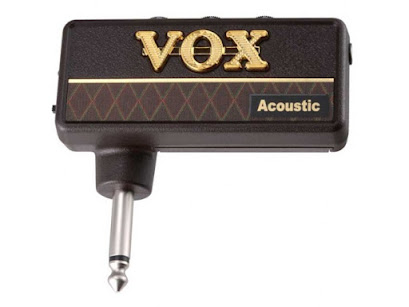Nowadays a lot of amps have the headphone option, so if you are a person with a busy daily life (like I am) and forced to practice mostly at night, when kids and/or significant others are asleep, that is a life saver. Nevertheless, I like and use even more portable options, and here they are, from the most to least frequent use in the 'shed.
 |
| The one I use |
Vox Amplug is a very convenient little preamp, whose main advantage is that it plugs straight into your instrument. It is also very small, easily fitting into pockets, so I sometimes carry it to work, if I can grab some time to practice there. The only additional thing you need is a set of preferred headphones, and you're all set to go! I have been using the first-generation acoustic model for years now, although the new bass model also features multi-positional option for plugging, as well as drum rhythms to play with.
 |
| New one |
However, since the older model also has the AUX input jack, the ability to connect you phone or mp3 player makes the drum beat option pretty much redundant. Besides, if I want to add more spice to the practice session, there is the next option...
Korg Pandora mini is an actual sound processor with the whole bunch of sound effects (overdrive, distortion, envelope filters, octave effect...plus amp and cabinet modeling), along with tuner and couple dozen drum beats in various styles. Like the above piece, it also uses 1.5 volt batteries, but in contrast to Vox, Pandora has the battery level indicator.
Being conceived as a full-fledged processor (albeit a very small one), it can be connected to a computer via USB for additional tone shaping options, and there is a full-size output jack to use it with your amp, as I did on several live gigs. That, however, raises the issue of having it connected to your instrument in a practical manner. And here is my solution:
The above option (double jack) essentially makes it plug directly into the guitar, and it works especially well with front mounted input jacks on instruments, although it worked fine for me with the lower edge jacks, too. The patch cable enables you to have it hanging on your strap or on the belt, i.e. still very mobile.
Phil Jones Bighead HA-1 is a step into top echelon options. The HA stands for headphone amplifier, but the unit is actually a hi-fi bass preamp with excellent connectivity. Besides the headphone jack, there is also the AUX one and USB port that has a dual function: used to charge the device (yes, it has an internal battery) as well as to connect it to your computer DAW for recording! The headphone jack can also be used to connect it to a power amplifier, active loudspeaker or mixer, so it can act as a DI box, too.
Compared to the first two pieces featured, this one is considerably larger and heavier (reflected in the price as well), so it won't just hang from your instrument, but the sound quality and other options for use make it a great option, especially if you don't move around much while practicing. Since I got mine a few years back, Phil Jones has put out a new model, HA-2, and other manufacturers have their contestants for the same position, so you may check them out to find one that best suits your needs.
To recap, here are my reasons for keeping all three at hand. For sheer ease of use and small size - Vox; for fun with effects and tonal options, plus gig flexibility - Korg; for quality of sound, both live and recording - Phil Jones.
The bottom line is, all of them will serve you very well for the original purpose espoused by this post, which is keeping your practice sessions quite to all those not partaking in it, while still offering you enough sound volume to fully expose any mistakes you make in practice, so you don't overlook anything that needs to be worked on.... Win-win situation!






No comments:
Post a Comment